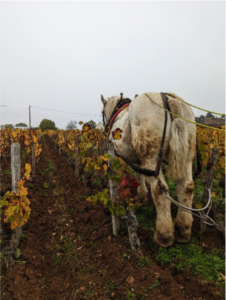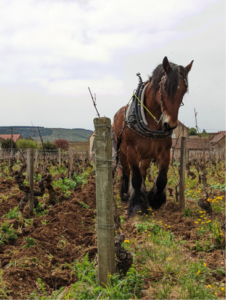Corcia family, through the efforts of Alain Corcia, founder of Prestige des Grands Vins de France, a negociant eleveur based in Savigny Les Beaune, has been in the wine business for 40 years.
Negoce has been run for a long time by Alain Corcia, is now under the management of Patricia Corcia, Alain’s wife.
Since late 2020, Raphael joined the family business after his wine studies and internship with Domaine Anne and Catherine Parent in Pommard.
Raphael is now totally in charge of domaine Alain et Raphael Corcia (formerly domaine de la Vieille Fontaine.
Domaine spreads over nearly 5 hectares in Mercurey and in Bouzeron.
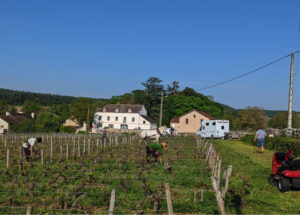
Production includes:
- Bouzeron
- Aligoté les Potets
- Bourgogne Chardonnay Les Petits champs Ronds
- Bourgogne Pinot Noir Les Cortechats
- Mercurey Red En grillot (our oldest plot)
- Mercurey Red Les vignes des Chazeaux
- Mercurey red Le Pontot Monopole
- Mercurey white Le Pontot Monopole
- Mercurey 1er cru Red Les Crêts
- Mercurey 1er cru white Les Crêts
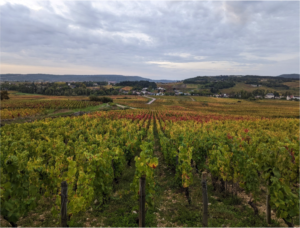
Age of plots
Some plots are very old, planted back in 1947 for the Grillot (very good location close to 1er cru Clos du Roy) and in 1969 to 1972 for the premiers crus.
Most of the Domaine is planted with vines coming from Massale selection (selection made like in the old days by our former growers). We are aiming when we replant to carry same philosophy (instead of buying plants from plant farms)
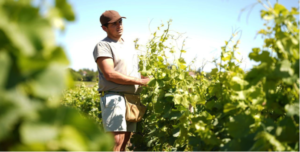
Wines are traditionally produced:
Traditional work in the fields. All work is done by HAND (Ecimage, trimming, stripping). In fact, tractor (except during winter tasks) is only used for natural treatment (organic certified – copper and sulfur) and ploughing. (In 2021 only two ploughing sessions) For our first crop in 2021, choice was to mow the land and to clear up in order not to flatten the land. We are controlling natural from vintage 2021, decision has been made to work with lunar calendar and we will go on. We also care in adapting cut to our different plots: Poussard, Guyot and Cordon de Royat and of course, we work on buds, green harvest, cutting of extra leaves, taking away verjus.
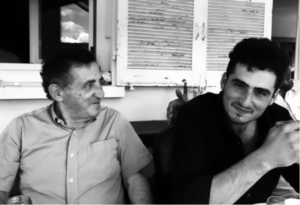
Domaine is under organic conversion and is working under principles of Biodynamic
Hand harvest with severe sorting out of grapes, in the fields and on draining tables. Harvest is done with a regular team of pickers, like in the old days. No baskets but 30kg cases never filled up in order to bring the best possible fruits to the winery.
First press only, if necessary, cold maceration, destemming (15% for 2021 vintage – will vary depending on vintage), daily footings (will also depend on vintage) Cold prefermentation.
Long vatting between 15 to, 20 days.
Must deposit (debourbage) in tanks and alcoholic fermentation in barrels for all whites.
Zero SO2 during fermentation of white wines. SO2 will be added only after fermentation
Ageing in 228- and 500-liter barrels for 15 months. (average)
At 25, Raphaël Corcia is a determined winegrower who is happy with his career.
New to the wine world, he wanted to go organic from the first year.
Son of merchants from Savigny les Beaune, specializing in the marketing of great Burgundy wines for 40 years, Raphaël CORCIA was rocked in trade and wine.
“I went to work school, but I was not destined for the vineyard at the start. It was during an internship at Domaine PARENT, in Pommard, that I got into it. It’s the educational model that appeals to me the most,” explains Raphaël. When he took over the estate in January 21, he set up a new cultivation method geared towards biodynamics for the 4 Ha of his property. « There is a real need not to work in a systematic way » explains the man who is faithful to his values and his deeply rooted convictions in terms of farming methods.
“You have to understand each plot, go further, be as consistent as possible,” he continues, specifying that he works without weedkillers or systemic phytosanitary products.
The horse for plowing the vines
For part of the plowing of the vines, Raphaël Corcia calls on local company. “I did not see with my own eyes the before and after of Biodynamics, I can only see, reveals the winemaker. For me, the horse has a real meaning, it brings less compaction to the soil, more quality, cohesion and precision in the work. And then it always brings life, much more human in the work of the vine. And also, a lower carbon impact”
If he did not think he was already at this stage of realization only a year after his installation, the neo-mercurian says he is “very proud to have succeeded in my first season, without any pride. At times things go faster than you think,” he says, adding that the field is set to develop.
The Newspaper of SAÔNE ET LOIRE – March 30, 2022
The fight of a young Burgundy winegrower for 100% organic production
ORGANIC VINEYARDS, BETWEEN DREAMS AND DESILLUSIONS (2/4) In Mercurey, the holy land of Burgundy wines, Raphaël Corcia launched himself alone, from the first year, into the production of organic wine. An unfailing commitment despite the difficulty of his work.
Last year, Raphaël Corcia bought an estate located in Mercurey, in Saône-et-Loire, to launch the production of organic wines. In conversion, he must wait an average of three years before obtaining the label.
Raphaël Corcia spends most of his time on his land. When we visit him, he is busy trellising the vines, an action that consists of tying the branches on a wire to make the plant grow taller. By hand, he surveys the 4 hectares that make up his estate, helped by a seasonal worker from Spain. A meticulous work that he began in 2021, with the objective of respecting the rules of organic farming from the first year of production.
From the height of his 25 years, Raphaël embarked on a risky adventure. His father owns a Burgundy wine trading business, mainly for export. But the son is the first winemaker in the family. He therefore bought an estate located in Mercurey, in Saône-et-Loire, to start his activity.
A first harvest without pesticides
“When I said I wanted to go organic, people thought I was a bit crazy at first. But I showed that I was able to make my first harvest without systemic treatment, despite a more than difficult year,” he says. Last year was tough for the winegrowers, with periods of intense frost. However, Raphaël has chosen to treat his plants only with copper and sulfur, as indicated in the organic specifications. Unlike pesticides and insecticides, which penetrate the plant, copper and sulfur must be applied preventively and do not resist rain as well.
Helped by a seasonal worker from Spain, Raphaël Corcia does not count his hours to meet the requirements of organic farming.
“I treat much more often than in traditional culture. So, it also requires more work. Raphaël also favors working by hand. “The advantage is that we always have our head in the vineyard so we spot the problems very quickly”,
Keep morale
During our conversation, Raphaël also spotted a trace of Oidium, a destructive disease for the vines. « It doesn’t smell good, » he says to his companion Cyrielle, 23, who works alternately for a nearby estate. Always on the alert, Raphaël does not count his hours. “I still have trouble disconnecting, I often worry. A few weeks ago, I decided not to treat, and there I say to myself, maybe I should have”, he adds.
But for him, ecological commitment takes precedence. “Political news is tense and global warming scares me. When I have my hands in my vines I feel like I’m in control, I feel like I’m acting for real. And I’m showing other areas that it’s possible with a little willpower,” he says.
In the fall, the estate will be able to market its first bottles with the reduced harvest from last year. Once he has obtained the European organic label, in three years on average, Raphaël Corcia does not rule out turning to biodynamics, of which he already follows some precepts.
Lucile Meunier / The newspaper “LES ECHOS” – August 4, 2022
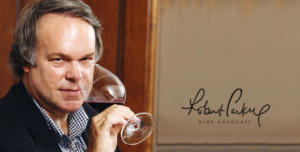
On August 2022 2023, ROBERT PARKER, the world’s most trusted authority in wine for over 30 years, came to the domain to taste 6 different wines.
Source: robertparker.com / August 2023 Week 4,
The Wine Advocate
2021 | Domaine Alain & Raphaël Corcia
Bourgogne Les Cortechats | Rating (91)
2021 | Domaine Alain & Raphaël Corcia
Mercurey 1er Cru Les Crêts | Rating (91)
2021 | Domaine Alain & Raphaël Corcia
Mercurey En Grillot | Rating (90)
2021 | Domaine Alain and Raphael Corcia
Mercurey 1er cru Les Crets white | Rating (91)
2021 | Domaine Alain & Raphaël Corcia
Mercurey Le Pontot | Rating (89)
2021 | Domaine Alain & Raphaël Corcia
Mercurey le Pontot white | Rating (89+)

RECRUITING STAFF BECOMES DIFFICULT IN BURGUNDY
As the harvest approaches, winegrowers are struggling to recruit. Obviously, things are getting stuck. Raphaël Corcia, winemaker at Mercurey, however, believes that he offers what is needed to attract people.
At 25, Raphaël Corcia humbly acknowledges this. He does not have the experience of the most winegrowers.
Yet from the eyes of a young entrepreneur,
He sees that recruiting staff is becoming a difficult task. And that challenges him. « It may be old guy to say that, but I don’t understand why we can’t hire when there is unemployment, » he wonders.
It was in December 2021 that he officially took over from the former Domaine de la Vieille Fontaine in Mercurey to produce a wine faithful to its values. So organic. Eventually, the goal is to no longer use a tractor, he says. Mechanization is my enemy.
At Raphaël Corcia, we favor manual work. This necessarily puts the body even more to work and sometimes leads to unforeseen events. From April to July, the entrepreneur recruited two seasonal workers. One went to the end of his contract, the other gave up his apron prematurely.
The picker is paid the hourly minimum wage
“She gave up after a month. Too hard,” explains the boss. Ideally, given the speed of growth of the vine and the increase in its operating area (it went from 3.2 to 4 ha by renting other plots).
Raphaël Corcia would have liked to work with two additional seasonal workers. Which he has never found despite conditions which he considers advantageous.
“I pay 11.50 euros gross per hour. And then here, it’s not the prison. We work hard but there are still good conditions. I have people who come to see me and ask me for €12.50 or €13. No, but that is not possible.“
The newspaper of SAÔNE ET LOIRE – August 9, 2022
Not possible,” he repeats, shaking his head from side to side. The discrepancy that prevents employees and bosses from agreeing is therefore there. Mainly monetary.
For the harvest, the Mercurey winemaker also considers that he has done what is necessary to train his teams.
“On the other hand, there is the minimum wage (11.07 euros gross) but the pickers are fed morning, noon and evening. They pitch the tent and they have access to showers and toilets. » For meals, is it a sandwich in the rows? “Are you kidding or what! No, no, these are homemade dishes”, he corrects, quite proud, with his bon vivant soul, to offer this service.
The ultimate argument for recruiting, the harvest atmosphere
At the end of the harvest, the temporary worker will also be rewarded with a bottle from the estate, a practice which was previously commonplace but which would tend to become rare. Then Raphaël Corcia comes out with his ultimate argument, just in case. “The harvest is a moment of celebration, it’s a great moment. In the evening, we drink some wine. Besides, last year, we partied a little too much”, laughs the young man. Despite this attractive picture, not many people jostle at the gate. Three weeks before the harvest, the boss is still looking for ten people to reach his goal of a thirty-headed team. For what will be the second harvest of his young career.
Ads on Facebook in particular
To complete its workforce, Raphaël Corcia multiplies recruitment announcements on social networks.
“On Facebook, I post ads in specific groups. Also, on Instagram. »
And to make his publications a little more punchy for potential candidates, the winemaker embellishes them with photos showing the atmosphere in the rows during the previous year, in September 2021. But three weeks before the start of the harvest (he thinks to harvest the first bunches on August 28), Raphaël Corcia is far from complete. A source of concern. « Of course, it’s stress, » he sums up.
He did not have time to put his nose back in his accounts but Raphaël Corcia made a quick calculation
The 2021 harvest, according to the estimates he has in mind, cost the estate he operates 10,000 euros. This figure includes the rental of tents, the food, the wines offered to the pickers and of course the wages for a day and a half of harvesting on the 3.2 hectares that he exploited then (today, his working surface has increased at 4 ha.).
“Last year recruitment went relatively quickly, between friends and friends of friends. 2021 was a vintage of luxury and comfort. I say that because I worked with family and friends and for me, it’s the best way to work. In 2022, recruitment is more complicated”
For Raphaël Corcia, the 2021 harvest, « it was a vintage of luxury and comfort »
